Kitchen
How to Achieve the Perfect Kitchen Feng Shui
Are you in the process of designing your kitchen renovation? If so, you may want to consider the basics of feng shui. Feng Shui is one of the most popular adaptations of Chinese culture, helping homeowners create a space where they can flourish while nourishing their family and friends. But incorporating feng shui into your kitchen isn’t as easy as it may look — there are a lot of dos and don’ts of kitchen feng shui to consider when planning your kitchen layout, color scheme, accents, and more. Follow along for 10 of our favorite tips for achieving the perfect kitchen feng shui.
1. Be mindful of the location
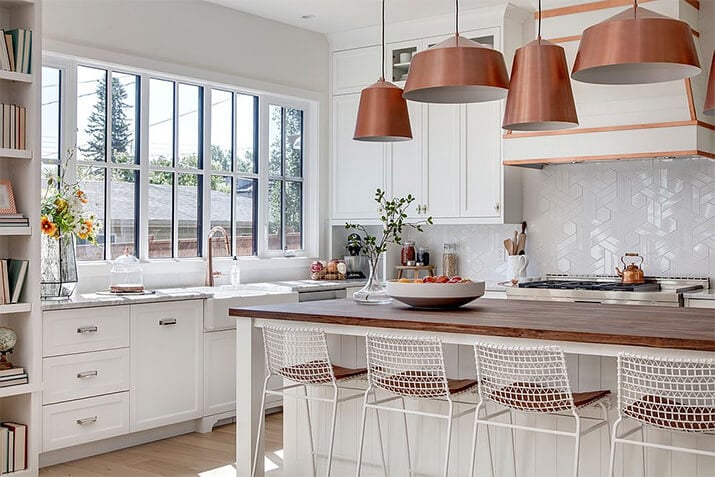
You’ve likely heard the phrase “the kitchen is the heart of the home”. However, if you’re aiming to achieve the perfect kitchen feng shui, you don’t want the kitchen to be located at the center of the home! The stove in your kitchen represents the element of fire, and if your kitchen is located in the center of the home, it symbolizes fire attacking the heart! This is believed to bring bad luck and negative energy to your home — the opposite of what you’re trying to achieve with feng shui. Instead, your kitchen should be located in the back of your home closest to the south or southwest corner.
2. Declutter the space
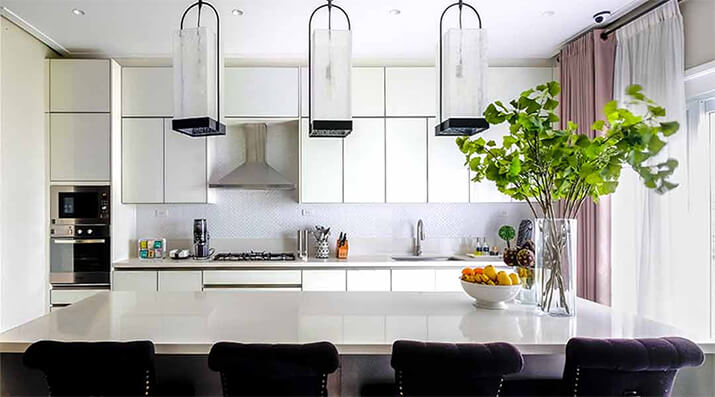
Because your family spends so much time in the kitchen, it’s easy for the space to become messy and cluttered. To evoke positive energy in the home, feng shui emphasizes a clean and uncluttered space. By removing excess clutter, it is believed that you are helping to bring health to your family. Achieve kitchen feng shui by regularly cleaning your appliances, clearing off your counters, organizing your kitchen tools, and making sure everything has (and remains in) a designated place.
3. Choose a color scheme
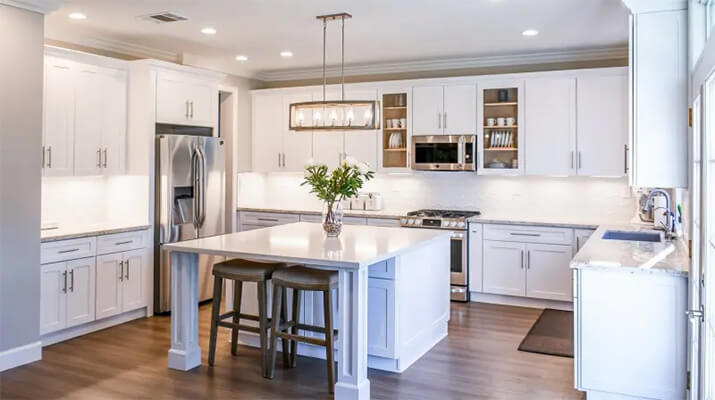
One of our favorite parts of the kitchen design process is selecting the color scheme. For a feng shui kitchen, you’ll often gravitate towards white color palettes as they represent purity and cleanliness. It also provides a nice contrast to the colorful dishes you’ll be cooking up in the kitchen. However, if white doesn’t tickle your fancy, you may opt for a color scheme that ties into the five elements of feng shui:
- Earth ? Brown and yellow for nourishment, stability, and grounding
- Wood ? Blue and green for growth, flexibility, and vitality
- Fire ? Red and bright orange for inspiration and passion
- Water ? Black and navy blue for social connections and wisdom
- Metal ? White and gray for precision and joy
4. Strategically place your sink and stove
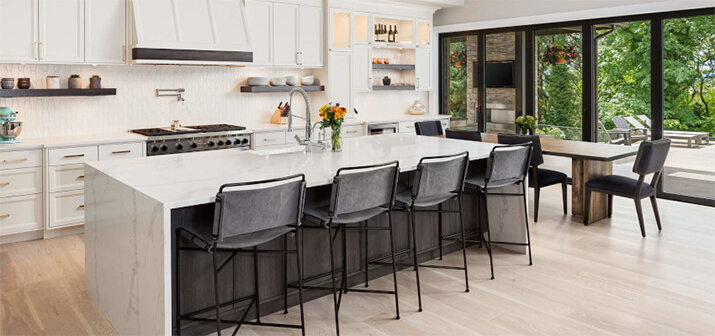
With feng shui, you want to keep the elements of fire and water separated in the space. This means that when designing your layout, you should place the sink and the stove apart but have them face one another. An L-shaped kitchen or U-shaped kitchen is optimal for creating this layout designed to prevent bad energy in your kitchen.
5. Avoid empty space above cabinets
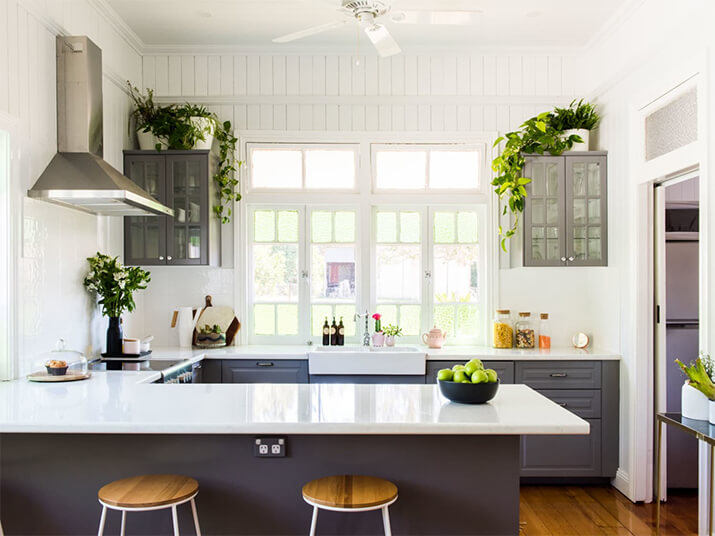
Depending on the types of cabinets you were considering, they may or may not extend to the ceiling. Feng shui discourages open space above the cabinets as it is believed that negative chi and dust can become trapped within this space. Instead, you should be filling the space above your kitchen cabinets. This can be done by selecting bamboo kitchen cabinets that extend to the ceiling or filling the spaces with kitchen decor or live plants to promote positive chi.
6. Install glass cabinets
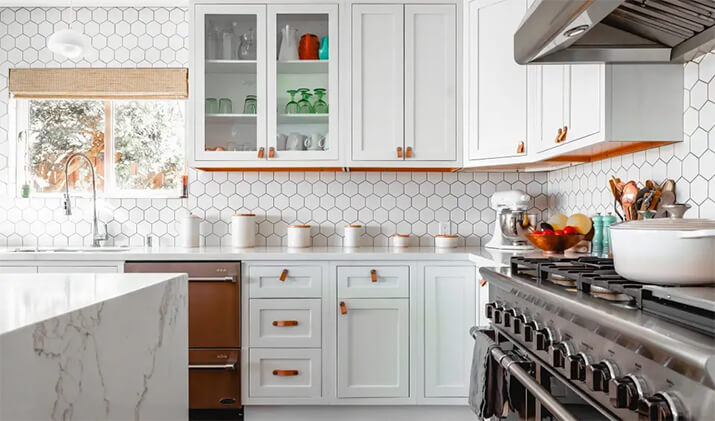
An important element of feng shui is maintaining an open space so chi can easily flow through the entire kitchen. Traditional cabinet doors can stifle this chi and make the room feel more negative and closed off. Instead, install cabinets with glass doors to help open up the kitchen and promote the movement of positive chi. Another benefit is that it will help promote cleanliness since you won’t want visible clutter to build up behind the glass panels.
7. Store knives out of sight
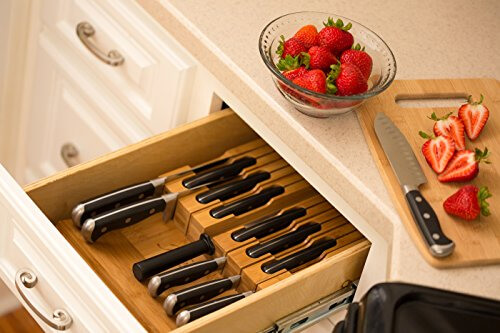
Creating a calm space is one of the key factors in achieving a feng shui kitchen. One of the most effective ways to do this is to store sharp knives out of sight. In traditional kitchens, many homeowners store a knife block on the kitchen countertop. The visual of sharp knives can create a feeling of discomfort and negative chi in your kitchen, allowing tension and negative energy to build up over time. To avoid this, store your sharp kitchen knives out of sight in a drawer instead of on your counters.
8. Hide the trash can out of view
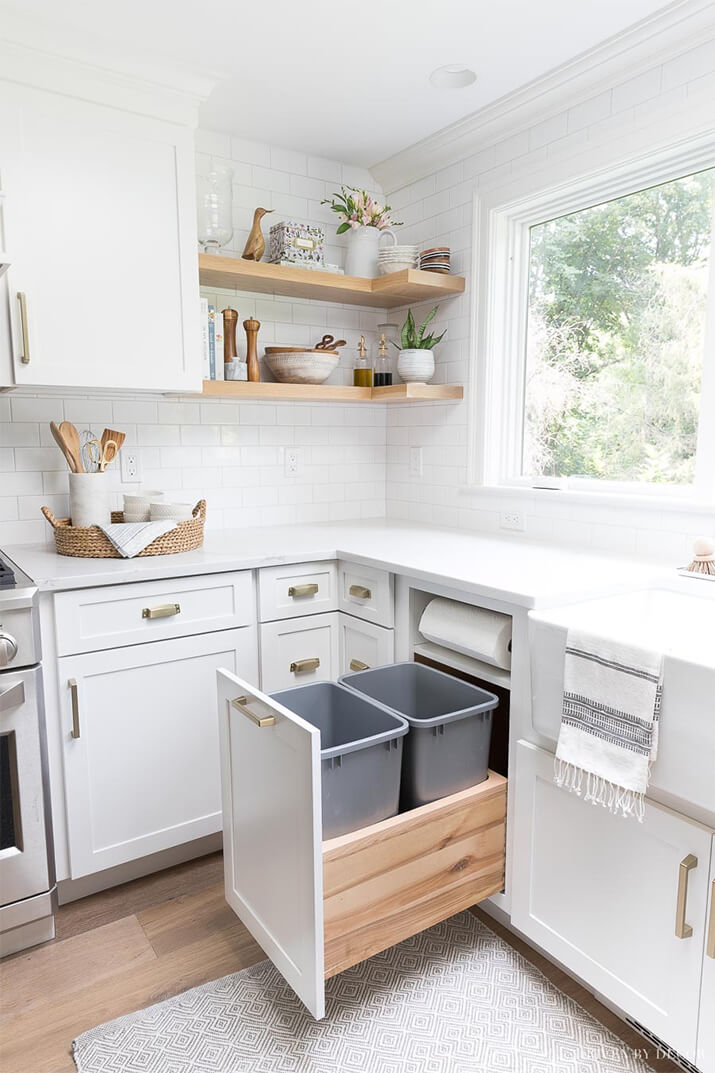
As you know, maintaining a clean and clutter-free space is extremely important for kitchen feng shui. If you have a trash can in clear view, you may experience an overwhelming sense of negative energy in the kitchen. Incorporate a hidden trash can that blends into your cabinets to avoid pulling from the nourishment in the room. Hiding them from view will help enhance the positive energy and health of the space.
9. Include nightlights in the space
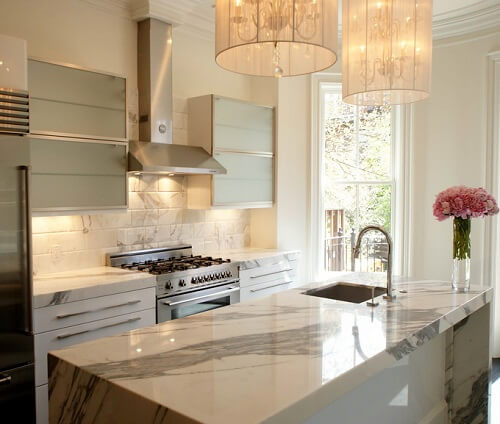
Although you may not spend too much time in your kitchen after the sun goes down, it’s still important to keep the room illuminated. A dark kitchen represents ill health and can bring bad chi into the space — something you want to avoid! When designing the layout of your kitchen, strategically place task lighting throughout the room. Another option is to add nightlights to a few empty outlets in the kitchen, evoking the fire element and helping to maintain positive and healthy energy in the room.
10. Use non-toxic cleaning supplies

When it comes to feng shui, it is important to maintain healthy and positive energy in the kitchen. However, you may be bringing in negative chi by using cleaning supplies that have harmful and toxic chemicals. Keeping your kitchen clean and clutter-free is a top priority, but you need to be mindful of the products you’re using and opt for non-toxic cleaners.
Frequently Asked Questions
What is the purpose of Feng Shui?
Feng Shui is an ancient Chinese art of arranging buildings, objects, and space in an environment to achieve harmony and balance. By achieving feng shui in a space, you will promote peace and prosperity in the home.
What are the five elements of Feng Shui?
The concept of feng shui embodies five elements: water, wood, fire, earth, and metal. When utilized correctly, each of these elements brings in positive chi to a space. Water denotes emotion and inspiration. The element of wood represents growth and creativity. Fire emphasizes leadership and courage. Earth signifies vigor and balance. Lastly, metal symbolizes focus and structure. Successfully combining and balancing these materials in your kitchen can promote positive chi.
What are Feng Shui faux pas?
While it may seem like there are a lot of rules to follow when striving for the perfect kitchen feng shui, the main principles center around a thoughtful L-shaped layout and an uncluttered space. However, there are a few faux pas you should avoid, such as placing mirrors improperly in a room, mixing flooring types, allowing clutter to build up, keeping cabinets or doors open, and storing kitchen tools in plain sight.
How long does it take for Feng Shui to work?
In most cases, consultants say that you will begin experiencing the results of feng shui in about three months. However, it can take longer for you to experience the positive energy in your space.
![See your dream kitchen in 3D [GET YOUR FREE DESIGN]](https://cdn.kitchencabinetkings.com/blog/wp-content/uploads/see-your-dream-kitchen-in-3d.webp)
![Contractor Discount Program: Offering contractors and builders special volume discounts on all applicable orders [LEARN MORE]](https://cdn.kitchencabinetkings.com/blog/wp-content/uploads/contractor-discount-program.webp)
![Explore our photo gallery [GET INSPIRED]](https://cdn.kitchencabinetkings.com/blog/wp-content/uploads/explore-our-photo-gallery.webp)
![What everyone is saying about KCK [READ REVIEWS]](https://cdn.kitchencabinetkings.com/blog/wp-content/uploads/what-everyone-is-saying-about-kck.webp)
![Get a cabinet sample [SHOP SAMPLES]](https://cdn.kitchencabinetkings.com/blog/wp-content/uploads/get-a-cabinet-sample.webp)
![Pay over time, on your terms with Affirm [LEARN MORE]](https://cdn.kitchencabinetkings.com/blog/wp-content/uploads/pay-over-time-on-your-terms-with-affirm.webp)